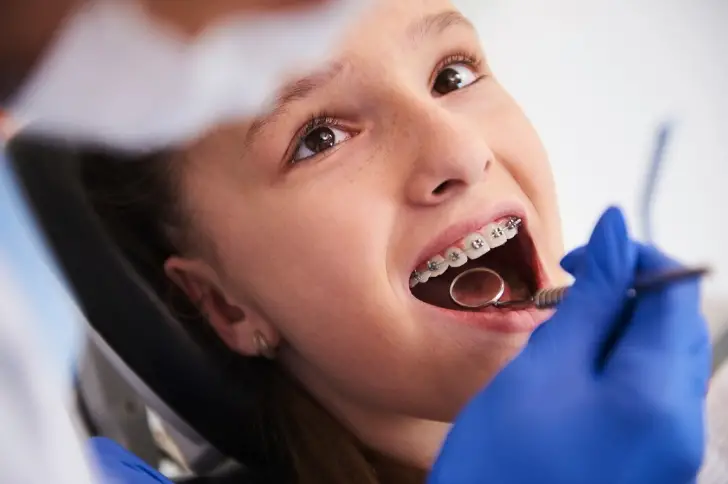Living With Braces

Living with braces is a journey that requires patience, diligence, and a bit of adjustment. While the end result—a straighter, healthier smile—is well worth the effort, the experience of wearing braces can pose several challenges and demands a proactive approach to oral hygiene, diet, and overall care. Here’s a comprehensive guide to help you navigate life with braces.
1. Oral Hygiene
Brushing and Flossing
Maintaining oral hygiene is harder when you have braces, but is very important. Braces can trap food particles and create breeding grounds for bacteria, increasing the risk of cavities and gum disease. Here’s how to keep your teeth and braces clean:
- Brush After Every Meal: Use a toothbrush (soft bristles are the best) and fluoride toothpaste. You will need to angle the brush carefully to clean around the brackets and wires. Consider using an electric toothbrush, as this will make it easier to clean more thoroughly.
- Floss Daily: Flossing can be tricky with braces, but tools like floss threaders or orthodontic floss can make the process easier. These tools help you thread the floss behind the wires, allowing you to clean between your teeth.
- Use Mouthwash: Rinsing with an antimicrobial or fluoride mouthwash can help reduce plaque and prevent tooth decay.
2. Dietary Adjustments
Certain foods can damage your braces, but more commonly food repeatedly gets stuck in them, so it’s important to adjust your diet accordingly. Here are some tips:
Avoid Hard and Sticky Foods
- Hard Foods: Nuts, hard candies, and ice can break brackets and wires.
- Sticky Foods: Caramel, chewing gum, and taffy can get stuck in your braces which is then very hard to clean off.
Cut Food into Small Pieces
For foods that are difficult to chew, such as raw vegetables or hard fruits, cutting them into smaller, more manageable pieces can help prevent damage to your braces.
3. Managing Discomfort
It’s normal to experience some discomfort, especially after getting your braces adjusted. Here are ways to manage it:
Pain Relief
- Over-the-Counter Painkillers: Medications like ibuprofen or acetaminophen can help alleviate pain.
- Orthodontic Wax: Applying orthodontic wax to the brackets can reduce irritation on your cheeks and gums.
Soft Foods
Eating soft foods like soups, mashed potatoes, and yogurt can help minimize discomfort during the initial adjustment period or after a tightening session.
4. Regular Orthodontic Visits
Regular visits to your orthodontist, such as this private dental services in Worcester, are essential for monitoring progress and making necessary adjustments. These appointments typically occur every 4-8 weeks. Skipping appointments can prolong your treatment time and impact the effectiveness of your braces.
5. Handling Emergencies
Braces emergencies, such as broken wires or loose brackets, can happen. Knowing how to handle them can prevent discomfort and damage:
- Broken Brackets: If a bracket comes loose, use orthodontic wax to hold it in place until you can see your orthodontist.
- Protruding Wires: If a wire is poking into your cheek, use a cotton swab to push it back gently, or cover it with orthodontic wax until your appointment.
6. Adapting to the New Normal
Adjusting to braces involves some lifestyle changes. Speaking clearly may take practice initially, and you might feel self-conscious about your appearance. Remember, these adjustments are temporary, and the benefits of a healthy, straight smile will last a lifetime.
7. Positive Mindset
Maintaining a positive mindset is important. Focus on the end goal and remind yourself that the discomfort and inconvenience are temporary. Many people find that their confidence grows as their smile improves, making the journey worthwhile.
Conclusion
Living with braces requires a commitment to oral hygiene, dietary changes, and regular orthodontic visits. While the process can be challenging, the result—a beautiful, straight smile—is a reward that makes the effort worthwhile. By following these tips and maintaining a positive attitude, you can ensure a successful and smoother experience with braces.
